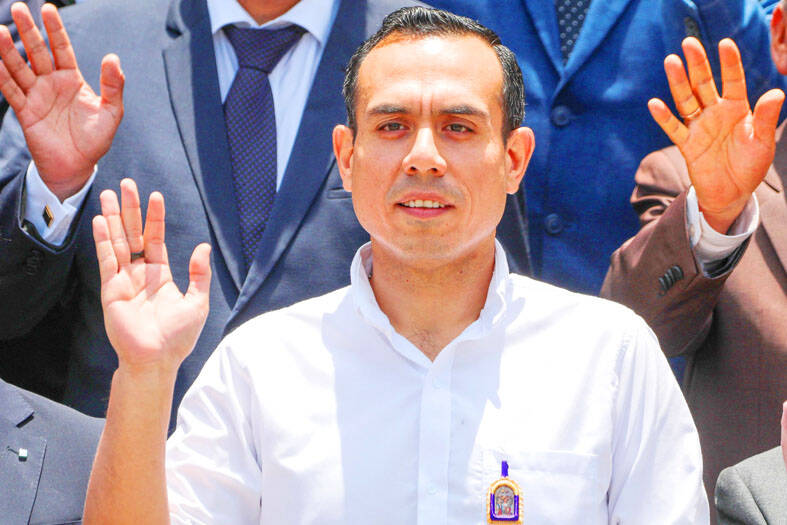Like a veritable action hero, Peruvian interim President Jose Jeri rolls up his sleeves to take part in nighttime raids on prisons and in the street, always making sure his bravado is captured on camera.
Jeri — barred from seeking election next year due to a constitutional one-term limit — has made crime the focus of what would be a short presidency ending in July.
As the 39-year-old seeks to stabilize a government rocked by anti-crime protests and political turmoil that led to the ouster last month of his predecessor, Dina Boluarte, Jeri has opted for a tough approach to what many perceive to be the country’s biggest challenge: crime.

Photo: AFP
“We are in the streets, on the ground,” Jeri said during a recent operation, insisting that finally a government was “addressing the problem directly.”
Many Peruvians blamed Boluarte for a surge in graft and criminality, particularly extortion, giving rise to protests led by Gen Z demonstrators that left dozens injured and at least one dead.
The unrest triggered Boluarte’s impeachment, and Jeri was sworn in on Oct. 10 as president.
For some, his strategy seems to be working.
“Something has changed compared to the previous government, whose presence was barely noticeable and didn’t engage in dialogue with anyone,” said Carmen Zuniga, a 50-year-old manager of a community kitchen in Lima.
Jeri has drawn comparisons to El Salvadorian President Nayib Bukele — who is criticized by rights groups for rounding up innocents in his war on crime even as he is praised by many at home for making life safer.
Throwing rights concerns out of the window, Jeri restricted family visits for inmates considered dangerous, and imposed a mobile blackout to prevent gangsters from using phones from prison to run their extortion schemes.
A Datum poll from February showed that 55 percent of Peruvians approve of Bukele’s iron-fisted approach.
More recently, an Ipsos poll found that 45 percent of respondents were in favor of Jeri’s actions, only slightly more than the 42 percent who were not.
Often dressed in jeans and a white collared shirt with rolled-up sleeves, Jeri has sought to cultivate an image as a man of action, posing for cameras along with law enforcement officials.
He set the tone from his very first speech, saying: “The main enemy is out there, in the streets. It’s the criminal gangs... and we must declare war on them.”
Just more than a week after he was sworn in, Jeri declared a 30-day state of emergency in Lima and Port of Callao, authorizing the army to patrol the streets and carry out arrests without warrants.
The results of Jeri’s approach are unclear, as he has yet to disclose any statistics.
“What I’ve seen are only populist measures... They are not effective as extortions and murders continue,” 20-year-old engineering student Jose Rodriguez said.

James Watson — the Nobel laureate co-credited with the pivotal discovery of DNA’s double-helix structure, but whose career was later tainted by his repeated racist remarks — has died, his former lab said on Friday. He was 97. The eminent biologist died on Thursday in hospice care on Long Island in New York, announced the Cold Spring Harbor Laboratory, where he was based for much of his career. Watson became among the 20th century’s most storied scientists for his 1953 breakthrough discovery of the double helix with researcher partner Francis Crick. Along with Crick and Maurice Wilkins, he shared the

OUTRAGE: The former strongman was accused of corruption and responsibility for the killings of hundreds of thousands of political opponents during his time in office Indonesia yesterday awarded the title of national hero to late president Suharto, provoking outrage from rights groups who said the move was an attempt to whitewash decades of human rights abuses and corruption that took place during his 32 years in power. Suharto was a US ally during the Cold War who presided over decades of authoritarian rule, during which up to 1 million political opponents were killed, until he was toppled by protests in 1998. He was one of 10 people recognized by Indonesian President Prabowo Subianto in a televised ceremony held at the presidential palace in Jakarta to mark National

US President Donald Trump handed Hungarian Prime Minister Viktor Orban a one-year exemption from sanctions for buying Russian oil and gas after the close right-wing allies held a chummy White House meeting on Friday. Trump slapped sanctions on Moscow’s two largest oil companies last month after losing patience with Russian President Vladimir Putin over his refusal to end the nearly four-year-old invasion of Ukraine. However, while Trump has pushed other European countries to stop buying oil that he says funds Moscow’s war machine, Orban used his first trip to the White House since Trump’s return to power to push for

LANDMARK: After first meeting Trump in Riyadh in May, al-Sharaa’s visit to the White House today would be the first by a Syrian leader since the country’s independence Syrian President Ahmed al-Sharaa arrived in the US on Saturday for a landmark official visit, his country’s state news agency SANA reported, a day after Washington removed him from a terrorism blacklist. Sharaa, whose rebel forces ousted long-time former Syrian president Bashar al-Assad late last year, is due to meet US President Donald Trump at the White House today. It is the first such visit by a Syrian president since the country’s independence in 1946, according to analysts. The interim leader met Trump for the first time in Riyadh during the US president’s regional tour in May. US envoy to Syria Tom Barrack earlier